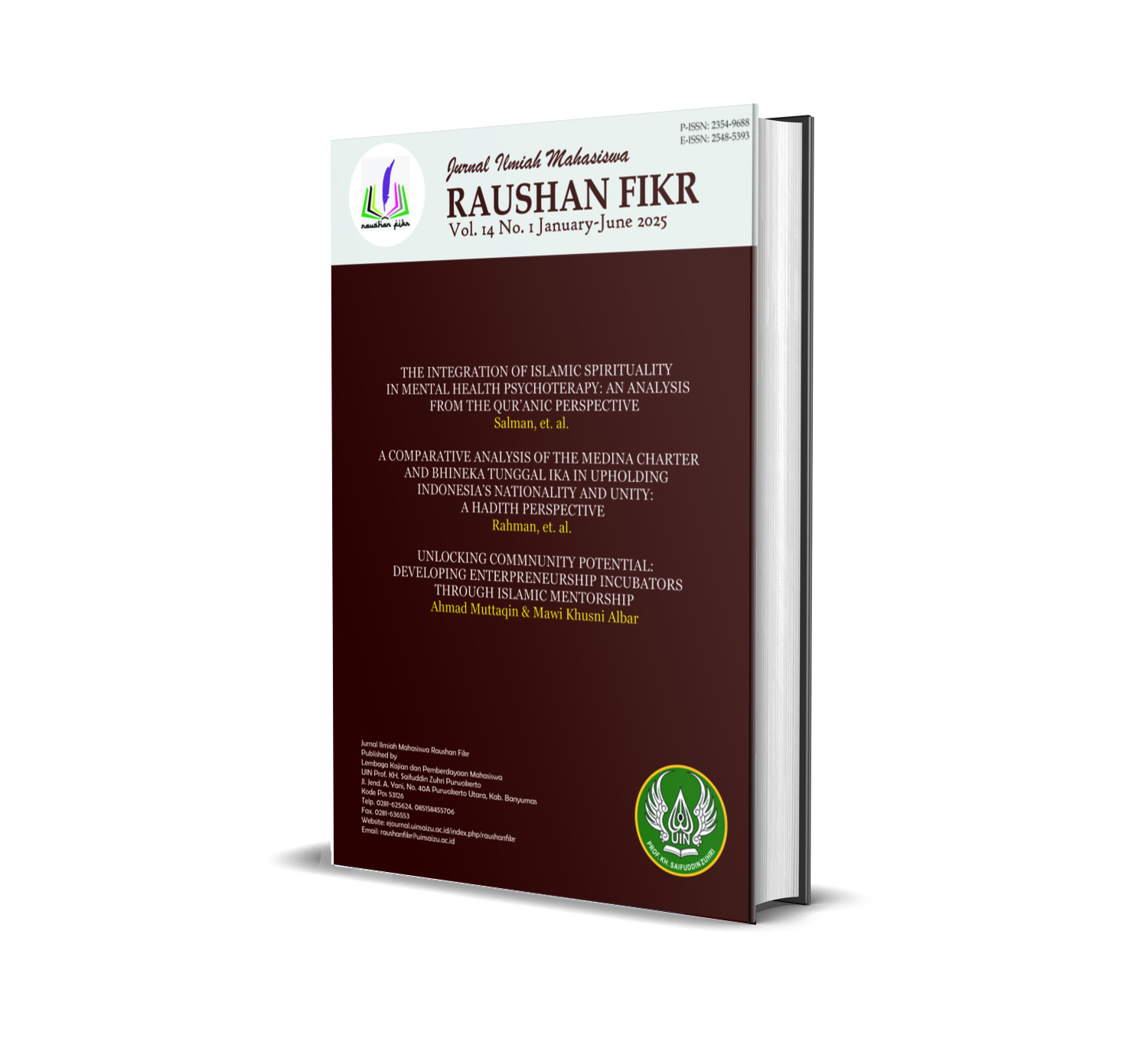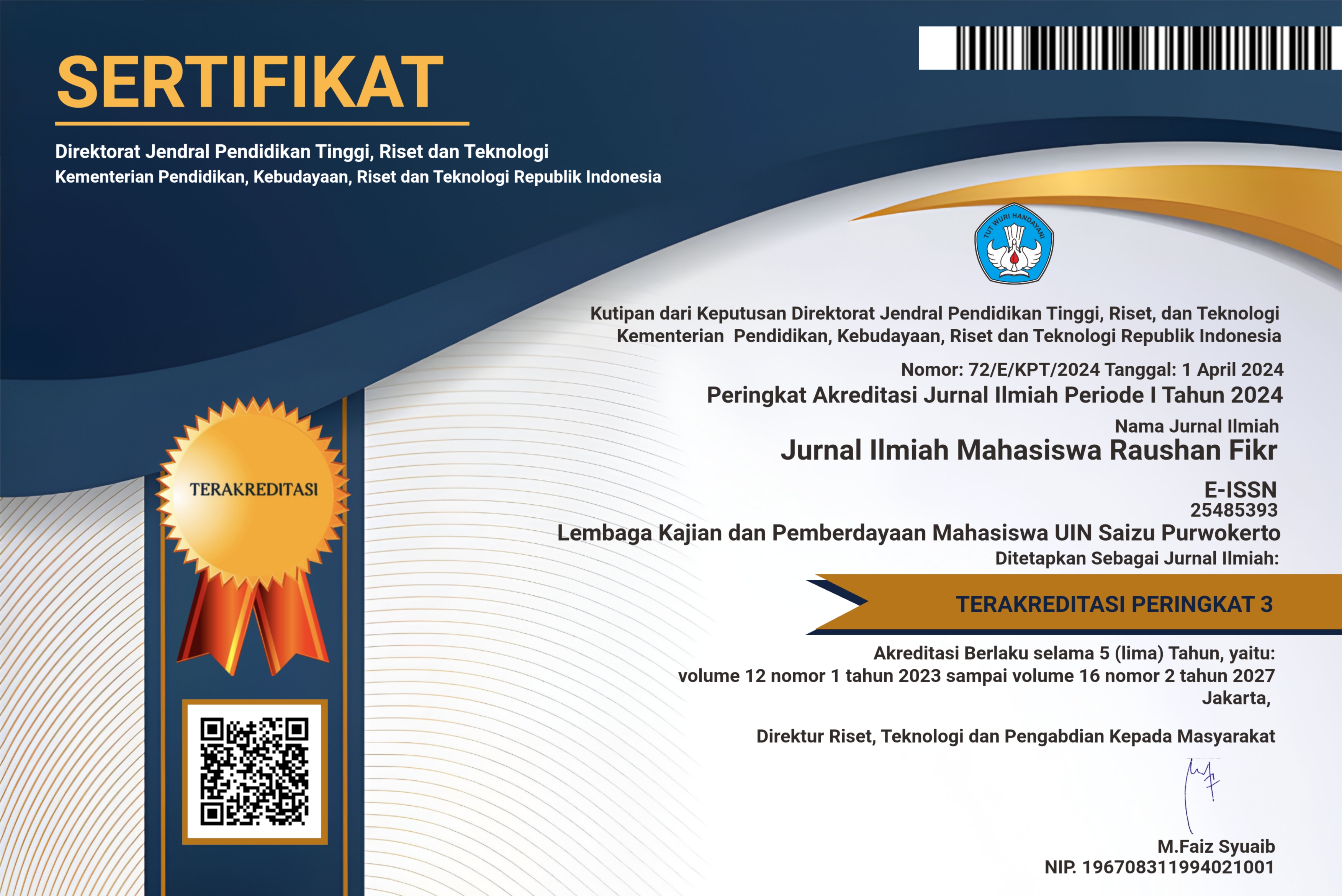Guiding The Generation: Lessons from Al-Azhar and Al-Misbah on Maisir and Moral Conduct
DOI:
https://doi.org/10.24090/jimrf.v14i1.13647Keywords:
Tafsir of Maisir, Buya Hamka, Quraish Shihab, Religious Education, Online GamblingAbstract
This study investigates the interpretation of maisir (gambling) as discussed in Surah Al-Baqarah [2]:219 and Al-Mā’idah [5]:90, by comparing two prominent works of contemporary Qur’anic exegesis: Tafsir al-Azhar by Buya Hamka and Tafsir al-Misbah by M. Quraish Shihab. Employing a qualitative, conceptual analysis through textual study, this research seeks to delineate the methodological differences in understanding the prohibition of gambling. Buya Hamka adopts a normative-exegetical approach, firmly emphasizing the moral and social corruption caused by all forms of maisir. In contrast, Quraish Shihab offers a contextualized hermeneutic, linking the prohibition to broader socio-economic dynamics within modern society. This paper further explores the pedagogical implications of integrating both interpretive frameworks within religious education curricula to enhance the moral awareness of Indonesian youth regarding the risks of gambling, particularly in its digital manifestations. The findings suggest that thematically integrated exegesis within religious instruction can serve as a constructive educational strategy to address contemporary moral challenges such as the rise of online gamblingDownloads
References
Amiruddin, F. Z. (2023). penafsiran ayat-ayat tentang Judi menurut Buya Hamka dan Hasbi Ash-Shiddieqy: Studi komparatif tafsir Al-Azhar dan tafsir Al-Qur’anul Majid An-Nuur.
Andrıawan, D. (2021). Interpretation of the Quran in Contemporary Indonesia: A Study on M. Quraish Shihab and His Work “Tafsir Al-Mishbāh.” Akif, 52(1), 1–19.
Anshori, M. (2021). Objek dan Ruang Lingkup Kajian Hadis Masa Klasik dan Kontemporer. Al-Irfani: Journal of Al Qur’anic and Tafsir, 2(2), 1–23.
Badan Pusat Statistik, B. P. S. (2023). Terdapat 1.572 kasus perceraian akibat judi online. Menkominfo.
Bakri, S., & Firdausiyah, U. W. (2023). Nikmat Sesaat Mengurangi Kesadaran Hidup di Hari Kelak (Analisis Penafsiran Qs. At-Takatsur dalam Tafsir Al-Azhar). Jurnal Ilmiah Mahasiswa Raushan Fikr, 12(1), 110–121. https://doi.org/10.24090/jimrf.v12i1.6055
Cahyaningsih, E., & Maemonah. (2024). Indonesian Penerapan Pendekatan Konstruksivisme Dalam Mengoptimalkan Kemampuan Berpikir Kritis Pada Pembelajaran Ipas Siswa Madrasah Ibtidaiyah. Jurnal Ilmiah Mahasiswa Raushan Fikr, 13(1), 118–129. https://doi.org/10.24090/jimrf.v13i1.11560
Calado, F., Vernon, M., Nuyens, F., Alexandre, J., & Griffiths, M. D. (2023). How Does Religiosity Influence Gambling? A Cross-Cultural Study Between Portuguese and English Youth. Journal of Gambling Studies, 40(2), 1005–1019. https://doi.org/10.1007/s10899-023-10269-0
Chóliz, M. (2016). The challenge of online gambling: The effect of legalization on the increase in online gambling addiction. Journal of Gambling Studies, 32, 749–756.
Donati, M. A., Beccari, C., Sanson, F., Iraci Sareri, G., & Primi, C. (2023). Parental gambling frequency and adolescent gambling: A cross-sectional path model involving adolescents and parents. Plos One, 18(2), e0280996.
Elbanna, M., Muthoifin, Nirwana, A., & Mahmudulhassan. (2024). Analysing the Role of Conti Entertain as a Gateway to Digital Gambling Among Teenagers Sharia Perspective: Challenges and Solutions. Demak Universal Journal of Islam and Sharia, 3(01), 1–12. https://doi.org/10.61455/deujis.v3i01.215
Gunawan, H., & Yanti, S. A. (2024). SANKSI HUKUM TERHADAP PELAKU GAME ONLINE DITINJAU DARI HUKUM ISLAM DAN HUKUM NASIONAL. Jurnal AL-MAQASID: Jurnal Ilmu Kesyariahan Dan Keperdataan, 10(1), 98–113.
Hamka. (1983). Tafsir Al-Azhar (Juz 1). Pustaka Panjimas.
Haq, A. M., Salamah, N. D., & Mundzir, M. (2021). Asketisme Dalam Al-Qur’an: Dari Teosentris Menuju Antroposentris (Studi Tafsir Maqashidi). SYAHADAH: Jurnal Ilmu al-Qur’an Dan Keislaman, 9(2), 83–115.
Haq, Z. R. H., M, Moh. A. H., & Efendi, A. K. (2023). The Role of Women in Livelihood Perspective of Contemporary Mufassirs. Muwazah, 59–74. https://doi.org/10.28918/muwazah.v15i1.1507
Hidayati, H. (2018). Metodologi Tafsir Kontekstual Al-Azhar Karya Buya Hamka. El- Umdah, 1(1), 25–42. https://doi.org/10.20414/el-umdah.v1i1.407
Hilyatin, D. L. (2021). Larangan Maisir dalam Al-Quran dan Relevansinya dengan Perekonomian. MAGHZA: Jurnal Ilmu Al-Qur’an Dan Tafsir, 6(1), 16–29.
Kementerian Komunikasi dan Digital., K. K. dan Digital. (2024). Judi online bisa bikin ekonomi RI rugi Rp1.000 triliun.
Lestari, P., Hidayat, S., & Muthoifin. (2022). The Values of Humanist Education in the Qur’an (Study of Tafsir Al-Azhar and Tafsir An-Nur). In D. Mutiarin, A. Nurmandi, A. K. Paksi, & Z. Rafique (Eds.), Proceedings of the International Conference on Sustainable Innovation on Humanities, Education, and Social Sciences (ICOSI-HESS 2022) (pp. 772–786). Atlantis Press SARL. https://doi.org/10.2991/978-2-494069-65-7_62
Maliha, D., & Alhusna, M. N. (2024). The Meaning of al-Maysir from the Perspective of Middle Eastern Mufasirs and Its Contex: English. An-Nur International Journal of The Quran & Hadith, 2(2), 11–23.
Muhith, O., & Kepri, D. S. (2024). Metode, Pendekatan, Kekurangan dan Kelebihan Mufasir Kontemporer Indonesia. Metode, 8(2).
Muid, A., & Nasrulloh, N. (2024). The Role of Education in the Formation of Character and Noble Morals from the Perspective of the Qur’an. Journal of International Multidisciplinary Research, 2(11), 218–226.
Mun’im, S. (2016). What’s Modern about Modern Tafsīr? A Closer Look at Hamka’s Tafsīr al-Azhar. In The Qur’an in the Malay-Indonesian World (pp. 212–225). Routledge.
MZ, A. M., Hidayat, M. R., HS, M. A., & Rifai, I. A. (2022). Repeated Interpretation: A Comparative Study of Tafsir Al-Misbah and Kajian Tafsir Al-Misbah on Metro TV. Dinika Academic Journal of Islamic Studies, 7(1), 135–160. https://doi.org/10.22515/dinika.v7i1.5093
Packer, M., O’Connor, C., McMurray, J. J., Wittes, J., Abraham, W. T., Anker, S. D., Dickstein, K., Filippatos, G., Holcomb, R., & Krum, H. (2017). Effect of ularitide on cardiovascular mortality in acute heart failure. New England Journal of Medicine, 376(20), 1956–1964.
Putri, L., Vera, A., & Visconte, A. (2023). Quraish Shihab and Buya Hamka: The Concept of Multicultural Education from a Qur’anic Perspective. International Journal of …, Query date: 2024-07-17 03:45:07. https://journal.ypidathu.or.id/index.php/ijen/article/view/236
Rahman, N. (2018). Kajian Ayat-Ayat Al-Quran dan Hadits Tentang Larangan Maisir. Fakultas Hukum Universitas Indonesia, 1(2). https://www.academia.edu/37571970/KAJIAN_AYAT_AYAT_AL_QURAN_DAN_HADIST_TENTANG_LARANGAN_MAISIR_SARNITI_1806246426_Fakultas_Hukum_Universitas_Indonesia
Ridwan, M. (2020). NASIONALISME HAMKA (Studi Analisis Tafsir Al-Azhar Karya Hamka tentang Cinta Tanah Air dan Bela Negara) [Undergraduate, UIN RADEN FATAH PALEMBANG]. https://repository.radenfatah.ac.id/19616/
Saefullah, M. (2024). Strategi Pembelajaran Pendidikan Agama Islam Pada Siswa Tunagrahita Di Smplb Wiyata Dharma Kota Metro.
Salim, F., Andito, M. S., Hanif, M., & Efendi, A. A. A. (2025). Bentuk Perkembangan dan Penafsiran Judi dalam Pandangan Al-Baqarah 219 dan Al-Maidah 90-91. Hamalatul Qur’an: Jurnal Ilmu Ilmu Alqur’an, 6(1), 107–120.
Salman, Sitorus, M. D. A., & Nasution, S. (2025). PERAN SPRITUALITAS ISLAM DALAM TERAPI KESEHATAN MENTAL: ANALISIS PERSPEKTIF AL-QUR’AN. Jurnal Ilmiah Mahasiswa Raushan Fikr, 14(1), 1–12. https://doi.org/10.24090/jimrf.v14i1.12169
Shihab, Q. (2000). Tafsir Al-Misbah (Jilid 1). Lentera Hati.
Sholihah, H., & Nurhayati, S. (2022). Prevention of Violence Against Children in School through Islamic Parenting Styles. Society, 10(2), 627–638.
Siricharoen, N. (2024). Cultivating Critical Minds: Interdisciplinary Strategies for Empowering University Students Against Online Gambling Propaganda. Community and Social Development Journal, 25(2), 173–194. https://doi.org/10.57260/csdj.2024.266169
Sriyana, S. (2025). Judi Online: Dampak Sosial, Ekonomi, Dan Psikologis Di Era Digital. JURNAL SOCIOPOLITICO, 7(1), 27–34.
Sumter, S., Bokhorst, C., Miers, A., Van Pelt, J., & Westenberg, P. (2010). Age and puberty differences in stress responses during a public speaking task: Do adolescents grow more sensitive to social evaluation? Psychoneuroendocrinology, 35(10), 1510–1516.
Suwito. (2024). Dampak Hukum dan Sosial dari Judi Online di Indonesia: Tantangan dalam Penegakan Hukum. Indonesian Journal of Intellectual Publication, 5(1), Article 1. https://doi.org/10.51577/ijipublication.v5i1.623
Taylor, L. M., & Hillyard, P. (2009). Gambling awareness for youth: An analysis of the “Don’t Gamble Away our FutureTM” program. International Journal of Mental Health and Addiction, 7, 250–261.
Yakin, A. U. (2019). Islam Moderat dan isu-isu kontemporer. KPN.
Zulkarnaini, Z. (2021a). Feminist Exegesis in Hamka’s Tafsir Al-Azhar. Jurnal Studi Ilmu-Ilmu Al-Qur’an Dan Hadis, 22(2), 403–426. https://doi.org/10.14421/qh.2021.2202-07
Zulkarnaini, Z. (2021b). Feminist Exegesis in Hamka’s Tafsir Al-Azhar. Jurnal Studi Ilmu-Ilmu Al-Qur an Dan Hadis, 22(2), 403–426. https://doi.org/10.14421/qh.2021.2202-07
Zulkarnaini, Z., & Badawi, M. (2021). The Relevance of Muhammad Abduh’s Thought in Indonesian Tafsir: Analysis of Tafsir Al-Azhar. Millah: Journal of Religious Studies, Query date: 2024-07-17 21:34:45. https://journal.uii.ac.id/Millah/article/view/19267
Downloads
Published
How to Cite
Issue
Section
License
Copyright (c) 2025 Muhammad Arif Saman, Hery Sahputra

This work is licensed under a Creative Commons Attribution-NonCommercial-ShareAlike 4.0 International License.
Authors who publish with this journal agree to the following terms:
- Authors retain copyright and grant the journal right of first publication with the work simultaneously licensed under a Creative Commons Attribution-NonCommercial-ShareAlike 4.0 International License that allows others to share the work with an acknowledgement of the work's authorship and initial publication in this journal.
- Authors are able to enter into separate, additional contractual arrangements for the non-exclusive distribution of the journal's published version of the work (e.g., post it to an institutional repository or publish it in a book), with an acknowledgement of its initial publication in this journal.
- Authors are permitted and encouraged to post their work online (e.g., in institutional repositories or on their website) prior to and during the submission process, as it can lead to productive exchanges, as well as earlier and greater citation of published work (See The Effect of Open Access).
















